|
|
Post by Katryna on Jul 31, 2005 20:17:16 GMT -5
Oh Kathy...the way Ronnie E. lights up the screen, it's impossible to look at anything or anybody else. Why even try? He's so pretty I could just cry... I wondered why I feel like crying every time I get ready to watch an episode! |
|
|
|
Post by rducasey on Jul 31, 2005 21:20:33 GMT -5
I was away for three days and couldn't wait to come home and watch an episode. I chose the pilot. LOVE that one. Especially that ending, and that smile, when he kids Karen about having a "fair" sense of humor. Sigh................
|
|
|
|
Post by carl1951 on Aug 10, 2005 1:02:54 GMT -5
The question from the cop about how much money Dunbar got as a settlement from shooting. He answering; All he wanted was his job back.
|
|
|
|
Post by hoosier on Aug 11, 2005 17:42:06 GMT -5
I noticed when Karen came in to tell Fisk that there was another murder victim,Jim had to take the intiative and ask who was he going to ride with since Hank couldn't drive. Otherwise he would probably have been sitting at a desk all day. He had already sat through the lecture that no one would want to partner with him, what could he do at a crime scene etc. Jim being Jim had gotten himself up to speed with the case,only asking what had they kept out of the papers. If Karen hadn't come into Fisk's office,Fisk would most likely have found Jim some paperwork to do and parked him at a desk and not partnered him up. I think in FIsk's office is where we see the first "lip bite"  |
|
|
|
Post by maggiethecat on Aug 12, 2005 12:22:31 GMT -5
I noticed when Karen came in to tell Fisk that there was another murder victim,Jim had to take the intiative and ask who was he going to ride with since Hank couldn't drive. Otherwise he would probably have been sitting at a desk all day. He had already sat through the lecture that no one would want to partner with him, what could he do at a crime scene etc. Jim being Jim had gotten himself up to speed with the case,only asking what had they kept out of the papers. If Karen hadn't come into Fisk's office,Fisk would most likely have found Jim some paperwork to do and parked him at a desk and not partnered him up. I think in FIsk's office is where we see the first "lip bite"  Great stuff! Just a quick thought or two: I think by the end of the interview with Fisk, Jim's made it pretty clear that -- limitations notwithstanding -- he's bound and determined to work cases as a detective. "I am not a civilian aide." Fisk opens the dialogue by telling Jim that the Chief of Ds has made it clear that Jim expects to be back out in the field, working cases . . . and then, after quizzing him about what he can and can't do at a crime scene and the gun thing, hits Jim with the fact that no one wants to work with him. 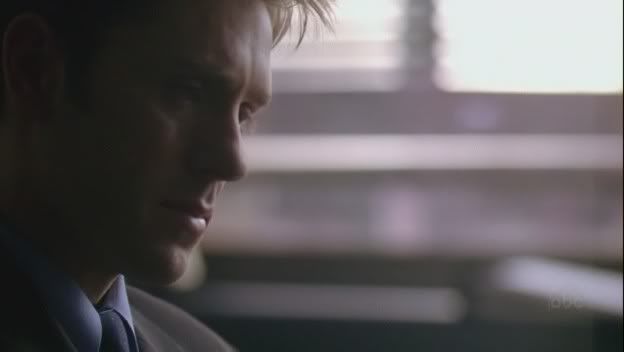 (I just put this in cuz he looks so purty -- and I couldn't find a screencap of the RE Lip Bite in this scene.) But, even though it's clear that Fisk thinks Jim working in the field is a lousy idea, I always thought Fisk knew he had to give Jim some sort of try -- if for no other reason than who wants the Chief of Ds down on your back?! (One scary dude, that Chief of Ds.) And Fisk does give Jim a try . . . on cheesy lowball cases like stolen cars and bad checks. I think that was Fisk's compromise: Yeah, I'll let the guy work cases, but crummy unimportant cases. So when Jim and Karen come up with the tie between the "pross homicides" and the stolen cars, Fisk tells them to turn their notes over to Russo and Sellway. You can work here, Dunbar, just not on anything that matters. Dunbar took on the Mayor and the whole department to get his job back. At this point Fisk doesn't know that Jim's not fond of the media -- for all he knows, if he *had* stuck Jim at a desk, the story would have hit the papers again. So he teams him up with the junior and most inexperienced member of the squad and gives them junk to work. It's not until the end of the Pilot that Fisk realizes that sticking Dunbar at a desk would have been a waste of talent and experience. And, from a common sense point of view, having Karen come to the door was a clever way to end the interview and get all of them out the door and onto the next scene! Also, the interview with Fisk is where we get the first and most important clue to Jim's "tell": glasses on or off. "Can we be honest?" Fisk asks. Jim agrees -- and off come the glasses. The glasses are off when he wants to get up close and personal, or when he feels comfortable -- he never wears them in the apartment, for example. |
|
|
|
Post by doobrah on Aug 12, 2005 14:46:26 GMT -5
Oh he does look purty. I can hardly concentrate on your salient points when I'm distracted by that photo.  |
|
|
|
Post by maggiethecat on Aug 12, 2005 15:34:05 GMT -5
Maggie, you make a lot of good points! First off, I agree with your theory on when/why Jim wears the dark glasses. But, this leaves me wondering...why didn't he have them on at Clay's dinner party? I can see why he would leave them off at Walter's retirement party, but at Clay's shindig? Christie's influence? Or maybe just the simple fact that when you pay for a great dramatic actor like Ron Eldard, you want to see his face. Even when using blank, unfocused eyes, as Eldard did, there was a lot going on in his face and we really needed to see it -- which is why, thinking back quickly, the glasses were never on for the big dramatic scenes or close-ups. So I'm thinking a lot of the time it was a director's and/or actor's choice. Gotta see those baby blues!!! Not to mention those four-inch long eyelashes.  |
|
|
|
Post by mlm828 on Aug 12, 2005 16:06:32 GMT -5
I think by the end of the interview with Fisk, Jim's made it pretty clear that -- limitations notwithstanding -- he's bound and determined to work cases as a detective. "I am not a civilian aide." Fisk opens the dialogue by telling Jim that the Chief of Ds has made it clear that Jim expects to be back out in the field, working cases . . . and then, after quizzing him about what he can and can't do at a crime scene and the gun thing, hits Jim with the fact that no one wants to work with him. But, even though it's clear that Fisk thinks Jim working in the field is a lousy idea, I always thought Fisk knew he had to give Jim some sort of try -- if for no other reason than who wants the Chief of Ds down on your back?! (One scary dude, that Chief of Ds.) And Fisk does give Jim a try . . . on cheesy lowball cases like stolen cars and bad checks. I think that was Fisk's compromise: Yeah, I'll let the guy work cases, but crummy unimportant cases. So when Jim and Karen come up with the tie between the "pross homicides" and the stolen cars, Fisk tells them to turn their notes over to Russo and Sellway. You can work here, Dunbar, just not on anything that matters. Dunbar took on the Mayor and the whole department to get his job back. At this point Fisk doesn't know that Jim's not fond of the media -- for all he knows, if he *had* stuck Jim at a desk, the story would have hit the papers again. So he teams him up with the junior and most inexperienced member of the squad and gives them junk to work. It's not until the end of the Pilot that Fisk realizes that sticking Dunbar at a desk would have been a waste of talent and experience. I have always thought that working in the field was part of the deal Jim struck with the City, along with carrying the gun, and Fisk would have been briefed on it when Jim was assigned to his squad. That is why Fisk asks Jim to reconsider and stay in the squad room. Otherwise, Fisk could simply have ordered Jim to stay in the squad room, or only assigned him tasks that could be done there. I don't think Fisk assigned the stolen-car and bad-check cases to Jim because he wanted to give him "crummy unimportant" cases. I think Fisk was genuinely concerned about the safety of his detectives, and at that time, he had no idea of Jim's capabilities. It is noteworthy that these cases involved non-violent crimes, which he may have thought would make them less risky. |
|
|
|
Post by hoosier on Aug 12, 2005 17:26:43 GMT -5
Great cap--he is just so darn good-lookin'  Another thing I noticed was a double "lip-bite"--he and Karen both doing it in the car during the "Anne episode". |
|
|
|
Post by maggiethecat on Aug 12, 2005 22:47:01 GMT -5
Another moment I just love: When Jim and Karen are interrogating Randy Lyman and Jim produces the evidence bag with the hairs he says are Lyman's, that the ME got off Lynn Bodner's body . . . 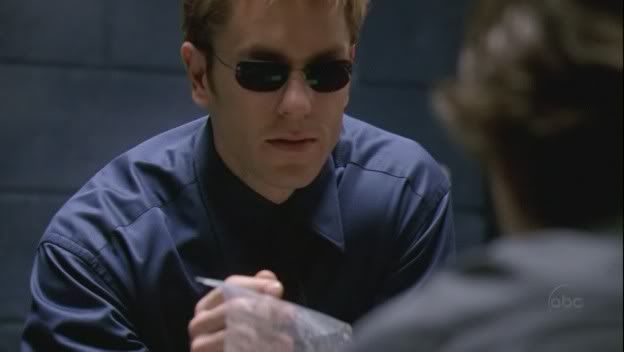 . . . and later, when he "fesses up" that they're his, and the quiet smirk on Fisk's face. And two lines that almost qualify for the humor thread, when Jim is right in Randy Lyman's face. "You want us to publish a manifesto in the newspapers? You want us to get your mommy on the phone?" 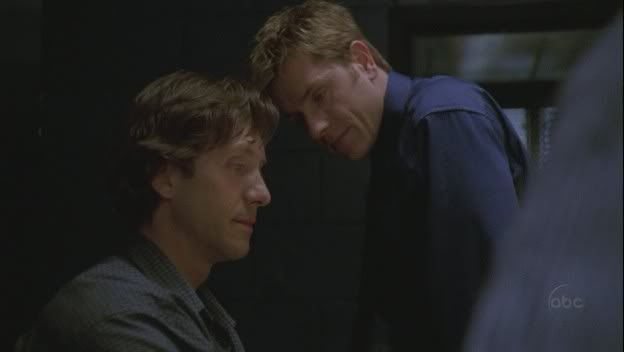 Get your mommy on the phone? Cracks me up, every time. |
|
|
|
Post by maggiethecat on Aug 26, 2005 20:55:15 GMT -5
Hey, mlm88! You raised some "absolutely" compelling points, which have been simmering away in the back of my mind -- didn't work their way to the front until the other night when, again, I watched The Pilot (which I once described as the insomniacs delight, and it still holds true). Yes, Fisk did indeed ask Jim to reconsider going out in the field again, even though it was clear that was part -- arguably the most important part -- of his reinstatement deal. And Jim declined. He refused. Politely, but he made it clear to Fisk that he wasn't about to sit at a desk, not even to placate his new boss. Bottom line? Blind or not, he's no civilian aide: he's a homicide detective. And yes, Fisk had no idea, at least not firsthand, of Jim's capabilities. But he knew the man's reputation, also that he had ten years on the job, and we can presume that he, Fisk, had full access to Jim's file, i. e. his rate of closing cases with the Two-Five. So I stand by my original contention that Fisk handing Jim crummy, inconsequential cases was his compromise. (I'm not sure that it was even for "the safety of his detectives," since 95% of detective work is mental.) It was a come-down, to say the least, as witness Karen's reaction. She's young and clearly not as experienced as Jim, and even she thought working stolen cars and bad checks was humiliating. "Meanwhile, there's a guy cutting girls' tongues out," she says when they're in the car together, "and we're workin' a stolen car."  This is not what homicide detectives do and she's angry, as witness the way she rips off her Latex gloves at the first crime scene when she and Jim are ordered off the case. "Can you get back to the car all right?" she snaps at him. She's pissed. She's really pissed. She's saddled with a partner who's going nowhere, since no one is about to let a blind man work major cases, no matter how gifted or experienced. Safety issues? Maybe. More likely that few can see past his disability. And this Jim understands, as we know from their conversation at the end of the episode. "If my lieutenant had tried to pair me with a guy who couldn't see . . . ?" he says to her. He knows what she's up against: together, linked as partners, they're facing the same narrowmindedness. 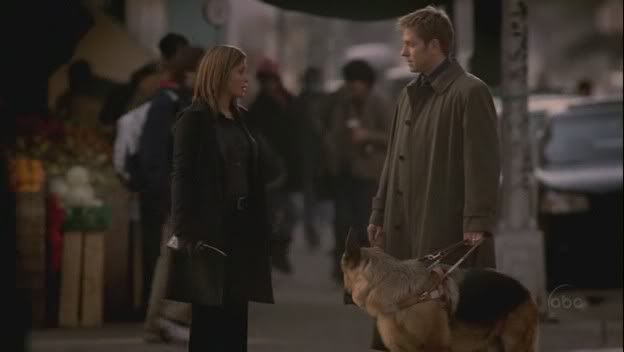 You can even argue that had Jim not taken the lead in the pross homicides -- forced the issue with Fisk, as it were -- he and Karen would have been stuck working low profile cases for some time. But Fisk comes around. The interrogation of Randy Lyman speaks volumes to this man, and that's where he starts to realize just what he has in Dunbar, and what sort of a contribution he can make.  Fisk just plain gets it -- even, I think, faster than Karen, faster than Tom, and certainly faster than Marty. Part of being a good administrator is assessing the capabilities of the men and women in your command. But the cases Fisk gives Jim in The Pilot clearly -- at least to me -- say, "I'm stuck with you. But I don't much like it and I'm not going to let you work anything that matters." It's not about the safety of his co-workers or non-violent crime: it's about that fact that Dunbar is blind. Aaah, don't we all just love The Pilot? Modified to fix a photo. |
|
|
|
Post by mlm828 on Aug 26, 2005 22:10:42 GMT -5
maggie, you have made some excellent points, and I don't disagree with anything you've said.
At the beginning of the Pilot, the only one who thought Jim could do the job was Jim himself. Fisk assigned him and Karen to inconsequential cases, because that was where Fisk thought Jim's perceived inability to do the job would cause the least harm. However, I also think that "officer safety" was a factor, because Fisk mentioned it, and the issue of safety surfaces later in the series, most notably in "Marlon's Brando". I agree that Fisk probably knew of Jim's record, but I question how much that knowledge mattered to Fisk, at the outset. As you correctly state, "few could see past his disability," including Fisk, at first. Fisk quickly caught on, however, and we don't see Jim handling any stolen-car or bad-check cases after the Pilot. I think you are right, however, that if Jim had not forced the issue by continuing to investigate the homicides, Fisk would have continued to assign him minor cases, at least until Jim demonstrated his capabilities. Based on what we've seen of Fisk, I think he would have figured out eventually what he had in Dunbar.
Another fascinating topic your post touches on is the evolution of Karen's attitude toward Jim over the course of the episode. She is majorly pissed off to be saddled with him at the beginning, especially when she is pulled off the "Tongue Collector" case to be Jim's chauffeur, as she sees it. But even early on, when they are called to the scene where Lynn Bodner has been found, they are discussing the case and trading theories about what might have happened to her. Karen clearly is not on board with the idea of being Jim's partner at this point; it is after this that she tells Jim she's going to talk to the Lt. about their arrangement. But we see the beginning of their working relationship in that scene, as well as -- perhaps -- Jim demonstrating to her that he can still analyze the evidence, even if he can't see it. I love the way she later defends Jim against Tom's charge that he almost got her killed, and tells the rest of the squad that "we" deserve a chance to question Lyman.
Yes, we love the Pilot.
|
|
|
|
Post by maggiethecat on Aug 26, 2005 23:17:38 GMT -5
Hey, mlm! I know I'll have more thoughts when I've digested yours, but for now let me thank you for keeping this most excellent and entertaining discussion alive and kicking. From the shootout at the bank . . . 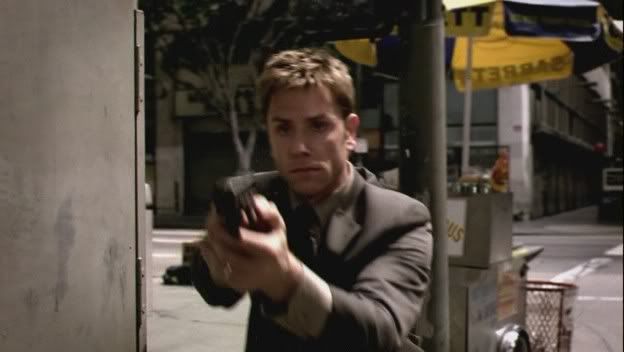 to the final scene . . . 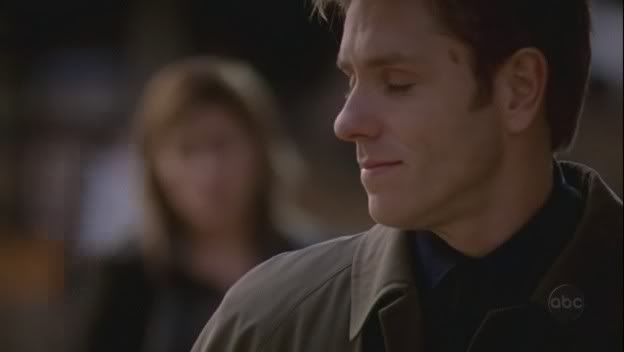 . . . it's definitely The Pilot! More tomorrow, I'm sure. |
|
|
|
Post by mlm828 on Aug 28, 2005 20:27:03 GMT -5
I want to add to my earlier comments about Karen's role in the Pilot. When she speaks up -- "We deserve a shot" and "We're clerks and not allowed to act like detectives?" -- she is speaking up for herself as much as for Jim. When Jim was assigned to the squad, she likely shared the prevailing opinion that he could not do the job and would not last. By the time of these statements, the events at the Lyman house have transpired, and she is probably re-evaluating her opinion. Jim may last on the job, and if she is going to have to work with him, she wants to be allowed to do her job and not have her career damaged. This concern comes to the surface in "Four Feet Under," when she tells Jim she doesn't want to be collateral damage if he is just trying to prove a point, but it is also present in the Pilot.
|
|
|
|
Post by maggiethecat on Sept 3, 2005 16:56:56 GMT -5
I want to add to my earlier comments about Karen's role in the Pilot. When she speaks up -- "We deserve a shot" and "We're clerks and not allowed to act like detectives?" -- she is speaking up for herself as much as for Jim. When Jim was assigned to the squad, she likely shared the prevailing opinion that he could not do the job and would not last. By the time of these statements, the events at the Lyman house have transpired, and she is probably re-evaluating her opinion. Jim may last on the job, and if she is going to have to work with him, she wants to be allowed to do her job and not have her career damaged. This concern comes to the surface in "Four Feet Under," when she tells Jim she doesn't want to be collateral damage if he is just trying to prove a point, but it is also present in the Pilot. Let's keep talking, mlm, if for no other reason than that it's a welcome diversion from watching CNN with a lump in your thorat and a knot in your stomach. Again, excellent points, and it's in The Pilot that we see the beginning of Karen's realization that Jim may turn out to be, not just a partner who won't drag her down, but someone from who she can learn, someone who will actually further her fledgling career with a good solid rate of closing cases. But it's just the beginning, and she still questions him for several episodes, although she goes along with what he says for the most part, for the simple reason that he's usually right. That, I think, is one of the most interesting aspects of Dunbar's character: It's not just that he's "the smartest guy in the squad, who happens to be blind -- this guy really does think outside the box. He's creative. And he trusts his instincts, sometimes when the facts dictate otherwise, as witness his interpretation of the lingering traces of Eric's cologne in "Rub a Tub Tub," and, most notably, as witness his insistence that he heard Terry Jansen fire the first shot in "Up on the Roof." Obviously, those he works with are bright -- you'd have to be to reach detective grade -- but there's a certain openmindedness in the way Dunbar thinks. And I have to think that's what appeals to Karen. He's not by the book. He thinks differently. more freely than Russo and Selway. Not that she's convinced, at first. Why should she be? I mean, some of Jim's suggestions are pretty wacky -- again, I'm thinking of the cologne, and of course digging up Rocky the dog in "Four Feet Under." But is digging up the dog that far off point? Not really, when you think about it -- it tells us two things about the father: he lies (even though he says it was to protect his sons), and, later, when Jim is talking to the younger boy and we learn that dear old Dad hit Rocky on the head. Again and again, we have examples of where Jim seems to be out on a limb . . . and, repeatedly, it turns out that a freewheeling attitude is exactly what was needed to close the case. "You think too much, Jimmy," Walter Cooke tells him. "That's your problem." Maybe . . . but it's also what makes him so good at his job. And that, I feel, is what cements his partnership with Karen, more than anything else. The way Jim attacks cases "impresses her," she finally tells him in "Under the Gun." (Is it "Under the Gun?" I confess, I haven't watched the later episodes as many times as the early ones featuring Angsty Jim  . And I like the fact that Karen doesn't come around immediately, although she's progressed far enough to let Russo have it when he hits her with the "bottom bitch" speech. She lets things play out, she goes back and forth, and, despite the fact that she's far more inexperienced than he, she is self-confident enough to tell Jim when she thinks he's wrong. As with so many other relationships in this series, Jim and Karen's partnership was written with humor and style, and a few surprises. Let's keep talking . . . ! |
|